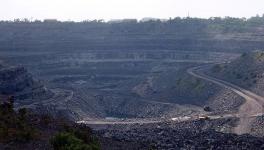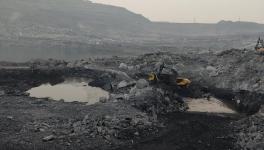“Our future is on the line” say Goa Residents as Commercial Projects Gain Momentum

Image credits: My Mollem campaign
As India auctions coal to private players for the first time in five decades and major corporates placing bids on the blocks, newer ways to transport coal are being looked at.
Amidst this, three major-transformative projects have gained approval despite local resistance.
The infrastructure projects include double-tracking of an existing railway line connecting the Mormugao Port in Goa with Hospet in Karnataka and widening of National Highway (NH) 4A which connects Panaji in Goa to Belagavi in Karnataka. It also includes a 400-kilovolt (kV) power transmission corridor from Dharwad in Karnataka to Xeldem in Goa. These projects are purportedly aimed at easing transportation of coal from the Mormugao Port in Goa to iron-ore rich areas of Karnataka where a number of steel plants are in the pipeline.
Work is simultaneously also underway to upgrade the Mormugao Port and construction of jetties across Zuari and Mandovi rivers to apparently handle more coal-laden ships. However, the maximum resistance from locals has been against the expansion of NH-4A, the double-tracking of the railway line and the 400-kV power transmission corridor, particularly because these linear projects will cut through the Bhagwan Mahaveer Wildlife Sanctuary and Mollem National Park, a protected area, and thereby affecting its flora and fauna and the lives of the locals.
Lives on the line, cultural identity at stake
In November this year, thousands of residents of Goa, took to railway tracks in Chandor to say no to coal transportation, this is the biggest movement Goa has seen to protect its natural resources.
Many letters, petitions and student led campaigns later, Goans continue to fight to stall the projects, as anxieties soar over the environmental devastation and loss of livelihood.
Umesh, a resident of the area bordering the National Park said, “The upcoming project of the transmission line is very close to our house barely 500 meters, the pristine springs in this area are already lost, now we feel that cultivation will no longer be viable. The boring and the pump will be set up here, this is likely to really affect us.”
Around Sangur at least six more villages will be affected. This includes over at least 1000 people. Worried he adds, “What will happen in this dense forest area, we fear that there will be a greater human animal conflict. These are long term effects, this is beyond development, this is about our future.”
In the past in Goa, a movement at this scale has not taken place in Goa amidst this many are taking inspiration from the the Aarey forest movement in Mumbai to protect the forests.
The proposed expansion of tracks will also pass through one of Goa’s largest protected areas-- The Mollem National Park -- and is likely to result in the felling of 37,000 trees by conservative estimates. Mollem is Goa’s largest ‘protected area’ that falls in the Western Ghats. It is one of the 36 biodiversity hotspots, recently declared as a natural World Heritage Site.
Speaking to NewsClick, Omkar a biologist from the Goa board conservation network said, “ The transmission line takes the route along the stream, two villages, Darghe and Tamdi are dependent on this water, for plantation and livestock, even for drinking purposes. Construction activity along the stream,with deforestation will lead to the erosion of soil which will end up the in stream drying faster than it usually does as it is a perennial source of water. The water from the stream and dudhsagar river is water supplied to northern Goa as well, this water will be polluted, affecting the water security of the region.”
However, the effect on the environment is not the only concern of the residents. A unique feature of Goa is its heritage homes, adding color and value to the identity of the state as a tourist destination. As the railway lines double up, the fate of the homes is unclear, a campaign is ongoing to save the homes from being destroyed. Locals are also fearing the impact on tourism in the coming years.
Dudhsagar Falls is a four-tiered waterfall located on the Mandovi River in the Indian state of Goa, with the possibility of the transmission line passing through, the business owners are fearing loss of work.
Speaking to NewsClick on the condition of anonymity, an inn owner said, “ For us, the problem is not the initiation of the projects, but the fact that this was done with No conversation with the people, we were told that the highway will be beneficial for us, but the truth is that the highway will have one single objective which is to transfer the coal.” he added, “The full potential of the wildlife and pristine forests have not been leveraged, this will be a dampner for us. Massive trains rattling through and trucks carrying lorries, who wants to come to a holiday destination with coal pouring through? This will damage not just the falls but local businesses.
Deepika D'Souza, from the Goyant Kolloso Nakka (Goa does not want coal) campaign told NewsClick that “people are objecting hugely to these projects. The government as it currently stands does not have clearances for these projects, the EIA process stands incomplete, therefore the government is giving a go ahead to this work illegally.”She claimed thousands of people had taken part in the protest, adding that the wide participation reflected serious concern that people had to save the state’s ecosystem and heritage.D’Souza said the process to initiate a coal route had already begun during the pandemic-induced lockdown. “During the lockdown, so many people were not around, and it is during this time that the government started this expansion. Many residents are now finding out that rubble is being dumped in their backyards.”
Get the latest reports & analysis with people's perspective on Protests, movements & deep analytical videos, discussions of the current affairs in your Telegram app. Subscribe to NewsClick's Telegram channel & get Real-Time updates on stories, as they get published on our website.
























